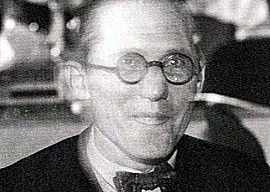
November 04, 2017

Charles-Édouard Jeanneret-Gris known as Le Corbusier
Source: Wikimedia Commons
Jeanneret’s writing is exhortatory and often ungrammatical, and is full of non sequiturs and dubious assertions without foundation. He raves rather than argues; everything is written in an imperious take-it-or-leave-it mode, interspersed with scribbled sketches or photographs of little relevance, and if you choose to leave it rather than take it, he soon insults you by claiming that you cannot see, do not understand, are incapable of real thought, etc. To read Jeanneret is to be cornered by a religious fanatic threatening you with eternal hellfire unless you accept his doctrine in full. It is a very unpleasant experience.
Jeanneret’s pronouncements, and the belief in them, led to the construction of a thousand urban hells, worse in some ways than traditional slums because they were planned and because they were specifically designed to eliminate spontaneous and undirected human contact or social life. Jeanneret hated what he called derisively the street, because the street was messy, it was unofficial and unofficiated. He hated it as an obsessively house-proud woman hates dust.
But the puzzle remains: How was such a man able to obtain and retain such a hold over other men’s minds, or at least over important men’s minds? I have no complete answer, though I suspect that the First World War had much to do with it. Without that cataclysm, Jeanneret would have been a crank, or a mere antisocial misfit; but so great was the emotional and intellectual dislocation understandably brought about by the war that almost anything seemed worthy of notice or consideration afterwards, anything that was different from what went before. And so Jeanneret had his chance.
Once his kind of modernism had taken hold, however, and its horrible failings had become obvious, the logic of Macbeth took over. Criminally bad architects (and in the West there have been very few others of late) have said with Macbeth:
I am in blood
Stepp’d in so far that, should I wade no more,
Returning were as tedious as go o’er…
And so they continue, original in nothing but the new outrages that they commit.